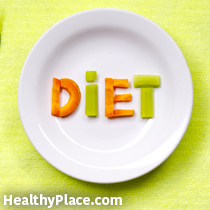Can Diet Affect Mental Health?

Can diet affect mental health? I went vegetarian for Lent this year. One thing I noticed is how much better I felt--I wasn't exhausted in the morning, I had more energy than normal, my head felt clear, and my mood was pretty much even all the time. It left me wondering "Can diet affect mental health?" And, if so, what dietary changes do we need to consider?
Make Some Changes to Your Diet for Your Mental Health
Add Probiotics
According to my psychiatrist, gastrointestinal doctors call the gut "the second brain." The healthier the gut, the healthier the person; and the better the person feels physically, the better her mental health (How Gut Health Affects Mental Health). One way to promote gut health is through probiotic foods. For me, this is usually home-brewed kombucha or homemade yogurt.
 While kombucha has many vitamins and minerals, they are usually not present in large enough amounts to be effective. However, kombucha helps you absorb the nutrients more efficiently, especially several types of B vitamins, which have been shown to help our bodies manage stress more effectively. In fact, most people who are drinking the right amount of kombucha will have florescent yellow urine from the excess B-vitamins.
While kombucha has many vitamins and minerals, they are usually not present in large enough amounts to be effective. However, kombucha helps you absorb the nutrients more efficiently, especially several types of B vitamins, which have been shown to help our bodies manage stress more effectively. In fact, most people who are drinking the right amount of kombucha will have florescent yellow urine from the excess B-vitamins.
Probiotics such as kombucha work by improving digestion. The better your digestion, the more efficiently your body operates. The more efficiently your body operates, the more clearly you think and the better you feel. Things such as low blood sugar can impact our mood. By having balanced digestion, we have the right kind of fuel for our body and spend less energy trying to fix a problem that we don't have to have.
Severely Limit Processed Food
I am on Supplemental Nutrition Assistance Program (food stamps). I used to have a food stamp diet--high in carbs and processed foods, especially sodium, low in fresh fruits and vegetables. This has changed. I learned how to cook and started making much of my own food from scratch--I joke I don't have food at my apartment, I have ingredients. I eliminated most processed food this way, and have noticed a tremendous change in my health. I am more alert and focused, and my mood swings aren't as frequent.
Two old sayings apply here: "You are what you eat" and "Garbage in, garbage out." If you eat junk, you'll feel like trash. If you eat healthy, you'll feel healthy. This is difficult to do on food stamps, but it can be done. Basically, throw out the processed food, make what you can from scratch, watch the sodium content of your food (canned foods are a culprit here), and be wary of any ingredients you can't pronounce. It's all about priorities.
I also go to a food pantry once a month, where I get a generous amount of food that is usually good for me. People are starting to realize that the poor need not only food, but wholesome, nutritious food, and are donating accordingly. Some food pantries also offer classes on how to prepare healthy food, which is another barrier to eating food that is right for us (you can't get much use out of an avocado if you don't know how to use it). Take advantage of opportunities like this--if your physical health is important, and it should be, mental health will often follow.
Replace Vitamins Zapped by Psychiatric Medications
My sister-in-law Brittany is an emergency medical technician, so the whole extended family is not allowed to get sick by being negligent toward our health. She is very well-read on my medications and has recommended some vitamins and supplements to replace the vitamins used by my body metabolizing the medications I'm on. For example, I'm on a birth control pill for pre-menstrual dysphoric disorder (PMDD). This uses up vitamins B and C, so I am on a multivitamin to compensate. I'm also on vitamin D and iron (since I'm anemic). When I start having mood swings, my vitamin profile is the first thing we check--and it's usually the culprit.
It is important to have enough of the right kind of vitamins and minerals. You have absolutely nothing to lose by using vitamins and supplements. At the very worst you'll have expensive urine. Your body needs vitamins and minerals to function properly, and we can't always get this through food or sunlight. Consult with your doctor to find out what supplements are right for you (Vitamins That Can Relieve Psychiatric Symptoms).
Diet can affect mental health. It is important to make good decisions in terms of diet, because what we eat can determine how we feel. So consider probiotics, throw out the processed food, and replace vitamins and minerals. The difference it makes will be noticeable.
You can also find Becky Oberg on Google+, Facebook and Twitter and Linkedin.
APA Reference
Oberg, B.
(2016, March 28). Can Diet Affect Mental Health?, HealthyPlace. Retrieved
on 2026, March 5 from https://www.healthyplace.com/blogs/recoveringfrommentalillness/2016/03/can-diet-affect-mental-health
Author: Becky Oberg
Daniel went on a 10 day diet of vegetables and water and looked better than the people eating the King's diet of wine and meat. Maybe there is something to it.
Great article! It just goes to show that anybody can learn to eat healthy even on a tight budget